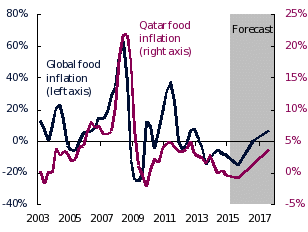Global food prices have not escaped the commodity rout, falling 24.3% since early 2014, according to the World Bank. Bumper harvests, weak demand and collapsing oil prices have driven food prices lower. Qatar’s food inflation has fallen with lower international prices as it imports almost all of its food. Looking forward, we expect global food prices to onlyfall marginally in 2016, before recovering moderately in 2017. As a result, they are likely to be less of a drag on inflation in Qatar in the next two years.
Three main factors are pushing global food prices lower. First,demand growth for food is weakening as global growth has been slower than expected, pushing down prices. The International Monetary Fund’s (IMF) revised expected global GDP growth down by 0.2% to 3.1% for 2015, compared with growth of 3.4% in 2014. Second, favourable weather conditions have boosted supply and stocks across a number of food products. Stock-to-use ratios for grains such as maize, wheat and rice, a measure of the abundance of supply compared to demand, are above their historical averages. Production of other products such as soybeans, soybean oil and palm oil are all rising. Third, lower oil prices have pushed down food prices as agriculture is highly energy intensive. For example, fertiliser prices are an important input for agriculture and are closely linked to energy prices.
These three factors are expected to continue to play an important role for the outlook of international food prices in 2016 and 2017. In 2016, higher global growthis expected (3.6% according to the IMF).Additionally, wheat production is expected to reach a new high as output in China, the EU and Kazakhstan has been revised up. Production of other products is also expected to rise. For example, the World Bank forecasts higher output of soybean seeds and soybean oil in 2016. Finally, oil prices are expected to stabilise around current levels in 2016 as excess supply is reduced.As a result food price deflations is expected to be reduced to 1.6% in 2016.
By 2017, we expect food prices to recover moderately. Global growth is expected to pick up again slightly to 3.8%. Additionally, supply and demand should adjust to lower food prices, gradually working out excess supply. Food producers are likely to invest less in productivity enhancements due to lower prices, while consumers should demand more. Finally, oil prices are projected to recover as investment cuts, mainly among US shale-oil producers, impact supply. As a result, we expect international food prices to rise 3.7% in 2017.
It should, however, be noted that food price forecasts are subject to unpredictable weather events. This is particularly relevant currently as the strongest El Nino on record is expected to peak this December-February, which could disrupt food output. El Nino is a weather pattern that recurs every 2-7 years and can lead to abnormal levels of rain, mainly in the southern hemisphere. For example, drier conditions in East Asia, which are expected to persist, have led to lower production of rice, particularly in Indonesia, where rice production is expected to be 1m-2m tons lower in 2015.While international food prices should be insulated from supply shocks due to high stock levels, there is a risk that a particularly severe El Nino could disrupt global food production.
The outlook for international food prices has implications for Qatar, which imports most of its food from abroad. This means that the food component of the consumer price index (CPI) in Qatar, which has a weight of 12.6% in the CPI basket, is closely linked to the World Bank food price index, as the chart below shows. If thehistorical relationship between domestic and international prices persists, then we forecast that domestic food prices should rise slightly in 2016 (1.5%) before picking up further in 2017 (3.2%).International food prices are not necessarily fully transmitted into the Qatari economy because of local factors such as transportation, manufacturing and retailing costs as well as domestic policies limiting price increases on staple foods.

In conclusion, global food prices are expected to fall slightly in 2016 before recovering in 2017. The transmission of this into the Qatari economy should lead to rising domestic food price inflation in 2016-17. As a result, food prices are expected to create progressively more upward pressure on Qatar’s CPI inflation, although this should be offset by disinflationary pressures in other sectors. Overall, we expect inflation in Qatar to remain moderate over 2016-17.
